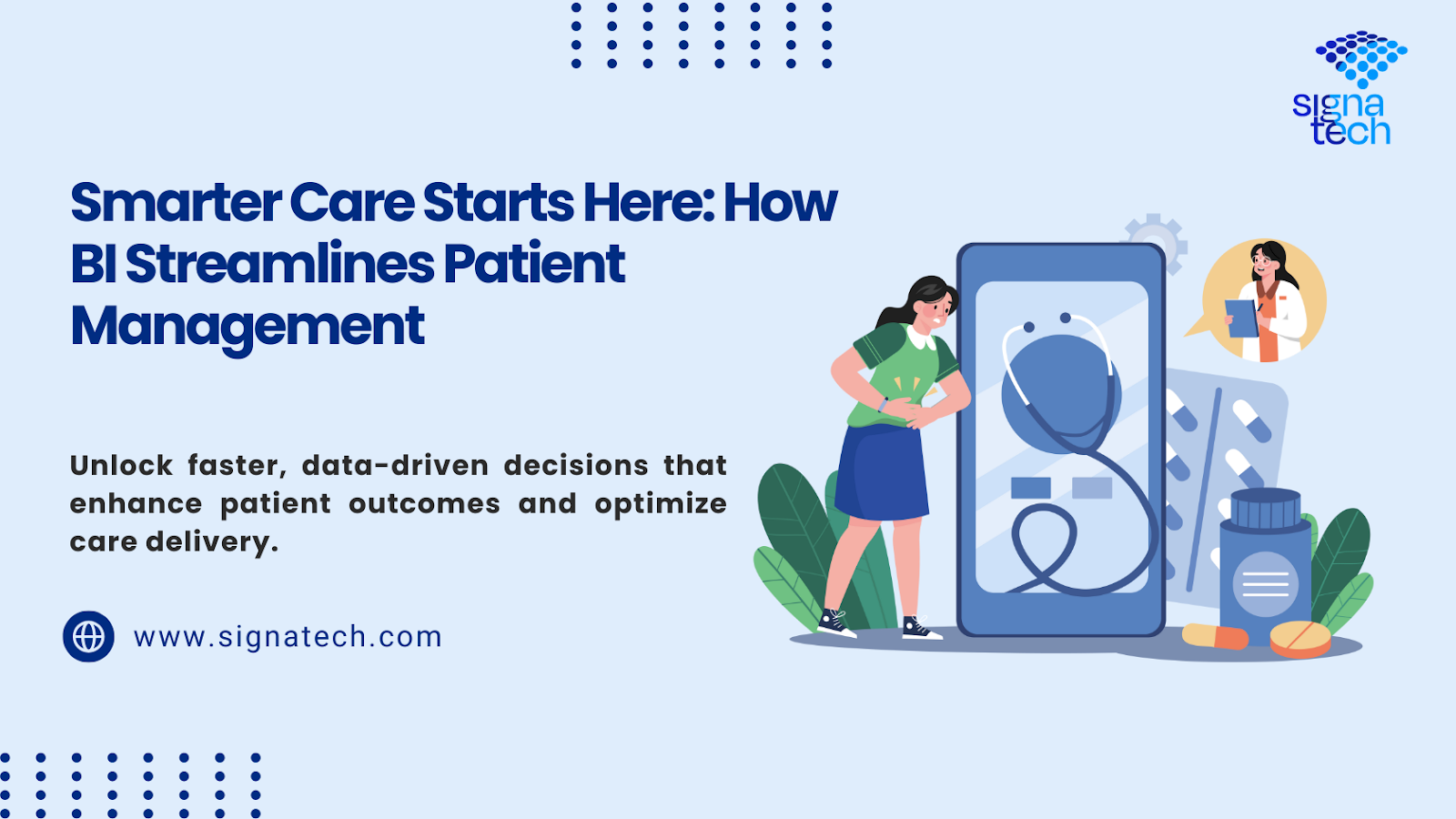Every single day, healthcare providers are managing enormous amounts of data, from electronic health records and treatment outcomes to billing systems and staffing operations. But, to have data isn’t enough. The power lies in converting that data into actionable insights that help with both patient care and operational efficiency. That is where BI Tools for healthcare providers are valuable.
“Business Intelligence” (BI) has changed the operation of healthcare organizations. BI can help medical organizations streamline workflows, reduce variations in clinical outcomes, increase patient satisfaction, and enhance operational efficiencies. This article reviews how BI helps healthcare providers with data management enhancement, performance enhancement, and possibly patient care.
The Growing Need for BI in Healthcare
Historically, lab results kept apart, billing in another, isolated patient records in one system, and so on. This fragmentation produced treatment delays, bottlenecks, and more opportunities for human mistake. These issues are quickly being resolved as BI tools for healthcare professionals become more common.
Modern BI solutions allow real-time access to important KPIs by combining data from many systems. From a single dashboard, a hospital administrator might monitor bed occupancy, emergency room wait times, and discharge rates. This one perspective helps providers stay nimble in unpredictable clinical environments and make faster, evidence-based decisions.
Benefits of BI Tools for Healthcare Providers
Healthcare organizations that implement BI tools witness measurable improvements across operational and clinical parameters. Some of the most compelling advantages include:
- Improved Patient Outcomes
BI tools help track individual patient histories, medication responses, allergies, and co-morbidities. Doctors can personalize treatments using past data, improving recovery rates and reducing complications. - Real-Time Monitoring
With dashboards and alerts, healthcare teams can monitor ICU statistics, emergency admission spikes, and surgical outcomes instantly. This real-time visibility ensures immediate response and better crisis management. - Resource Optimization
BI tools analyze staff scheduling, equipment usage, and supply chain patterns to recommend better allocation. This leads to cost savings and prevents resource bottlenecks. - Data-Driven Decision Making
Instead of relying on guesswork, administrators and clinicians can use historical trends and predictive analytics to plan patient loads, allocate specialists, or even prevent outbreaks. - Regulatory Compliance and Reporting
Generating compliance reports is often time-consuming. BI tools automate data compilation and formatting to align with healthcare standards like HIPAA, NABH, or JCI. - Patient Engagement and Satisfaction
By analyzing feedback, appointment patterns, and service usage, healthcare providers can identify areas for improvement and tailor services to enhance the patient experience.

#image_title
Key Areas Where BI Tools Make a Difference
Beyond just record keeping and reporting, BI tools for healthcare providers are transforming multiple core areas: Clinical Analytics: Uncover hidden trends in diagnosis, treatment effectiveness, and readmission rates.
- Clinical Analytics: Identify hidden patterns related to diagnosis and treatment effectiveness, and readmission rates.
- Financial Analytics: Monitor billing, claims, and revenue cycles for improved financial health.
- Operational Analytics: Track billing, claims, and revenue cycles and drive better financial health.
- Population Health Management: Improve scheduling, inventory, and infrastructure use.
If you are a small specialty clinic or a large health system, BI tools can ensure that every clinical or administrative decision is data informed.
Challenges and Considerations
There are many potential challenges to the adoption of BI in health care even with the benefits to patient outcomes:
- Data Privacy & Security: Keeping sensitive patient data secure is non-negotiable.
- Integration with Legacy Systems:Hospitals run many legacy systems with software that may not seamlessly integrate with BI tools.
- Training and Adoption: The clinician and non-technical staff require user-friendly dashboards and training to maximize the use of the system.
To address these challenges, health care providers need to select BI platforms that have been designed for the healthcare industry and expect a high level of proper implementation support.
How to Get Started with BI in Healthcare
Adopting BI tools for healthcare providers doesn’t require a complete overhaul overnight. Here’s a phased approach to get started:
- Assess Current Data Systems: Identify where your data is stored and how it’s currently being used.
- Define Key Metrics: What problems are you trying to solve? High readmission rates? Poor utilization of operation theaters?
- Choose a Healthcare-Focused BI Tool: Opt for solutions that offer healthcare-specific modules and integrations.
- Build an Internal BI Team or Partner with Experts: Ensure ongoing support, training, and adaptation to changing needs.
- Start with Pilot Projects: Test BI in one department like emergency or radiology before rolling it out organization-wide.
Empowering Patient Care with Intelligence
The future of healthcare is about personalization, efficiency, and agility, and BI tools for healthcare providers are the key to this vision. BI puts healthcare organizations in position to operate more intelligently and serve patients better – from improving accuracy in quality diagnostics to streamlining administrative workflows.
Hospitals that embrace BI and utilize analytics will save money and build patient trust through transparency, accountability and improved patient care. As patient expectations rise and the competition between healthcare institutions increases, our research suggests that the successful and strategic use of BI could help your organization get ahead of the rest.
If you are a healthcare organization looking to make the leap in your services, it’s time to think about utilizing BI tools for healthcare organizations. If you have the proper mindset with strategic direction, you or your organization will be on a path towards intelligent patient-centric healthcare. Relying on a trustworthy Business Intelligence consulting service, such as SignaTech, guarantees that your BI implementation will align with your clinical and operational goals – enabling you to make better decisions, leading to better patient outcomes and increased performance across departments.
